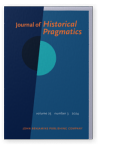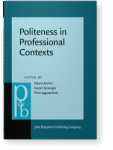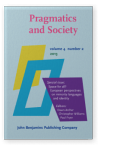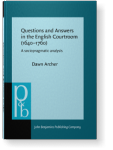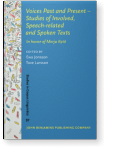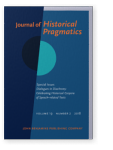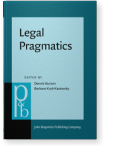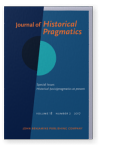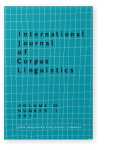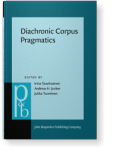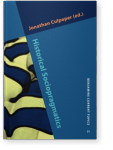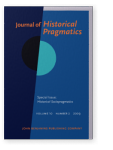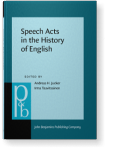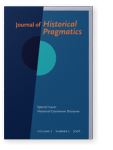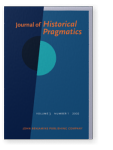Dawn Archer
List of John Benjamins publications for which Dawn Archer plays a role.
Journal
Titles
Politeness in Professional Contexts
Edited by Dawn Archer, Karen Grainger and Piotr Jagodziński
[Pragmatics & Beyond New Series, 311] 2020. vi, 326 pp.
Subjects Communication Studies | Discourse studies | Pragmatics
Space for all? European perspectives on minority languages and identity
Edited by Dawn Archer, Christopher Williams and Paul Fryer
Special issue of Pragmatics and Society 4:2 (2013) v, 130 pp.
Subjects Discourse studies | Pragmatics | Sociolinguistics and Dialectology
Questions and Answers in the English Courtroom (1640–1760): A sociopragmatic analysis
Dawn Archer
[Pragmatics & Beyond New Series, 135] 2005. xiv, 374 pp.
Subjects Discourse studies | Historical linguistics | Pragmatics | Sociolinguistics and Dialectology
2020 Chapter 13. The value of facework in crisis negotiation: With a focus on barricade situations Politeness in Professional Contexts, Archer, Dawn, Karen Grainger and Piotr Jagodziński (eds.), pp. 299–322 | Chapter
2020 Chapter 3. Keywords that characterise Shakespeare’s (anti)heroes and villains Voices Past and Present - Studies of Involved, Speech-related and Spoken Texts: In honor of Merja Kytö, Jonsson, Ewa and Tove Larsson (eds.), pp. 31–46 | Chapter
This chapter undertakes a keyword analysis of seven Shakespearean characters: Titus, Tamora, Aaron, Lear, Edmund, Macbeth and Lady Macbeth. The chapter discusses how, once contextualised, these keywords provide useful insights into their feelings/thoughts towards others, events, motivations to… read more
2020 Chapter 12. Keeping airports safe: The value of small talk Politeness in Professional Contexts, Archer, Dawn, Karen Grainger and Piotr Jagodziński (eds.), pp. 273–298 | Chapter
2020 Chapter 1. Introduction: Politeness in professional contexts Politeness in Professional Contexts, Archer, Dawn, Karen Grainger and Piotr Jagodziński (eds.), pp. 1–22 | Chapter
2018 Impression management in the Early Modern English courtroom Dialogues in Diachrony: Celebrating Historical Corpora of Speech-related Texts, Kytö, Merja and Terry Walker (eds.), pp. 205–222 | Article
This paper draws upon three texts from the trial section of the Corpus of English Dialogues, in order to explore the tactical impression management strategies used by Early Modern English courtroom participants (defendants, judges, lawyers and witnesses). I will demonstrate that modern… read more
2018 Chapter 9. Achieving influence through negotiation: An argument for developing pragmatic awareness Legal Pragmatics, Kurzon, Dennis and Barbara Kryk-Kastovsky (eds.), pp. 181–202 | Chapter
This chapter focuses on a now-infamous case involving 20-year old Grant Sattaur and a Californian Police Negotiator. We focus, in particular, on the last four minutes of their two-hour conversation in 2007, prior to Sattaur taking his own life. We demonstrate that, by this point in their… read more
2017 Context and historical (socio-)pragmatics twenty years on Historical (socio)pragmatics at present, Włodarczyk, Matylda and Irma Taavitsainen (eds.), pp. 315–336 | Article
This paper has two purposes. First, it constitutes an exploration of context from the perspective of some prominent historical pragmaticians, and/or as demonstrated by publications which represent/exemplify a particular approach within historical pragmatics (Jacobs and Jucker 1995; Archer and… read more
2017 Tracing facework over time using semi-automated methods International Journal of Corpus Linguistics 22:1, pp. 27–56 | Article
Impolite behaviour tends to attract more evaluative comment than other facework, making it easier to investigate synchronically and diachronically. A reliance on metapragmatic commentary is not optimum for UK parliamentary studies, however, as MPs cannot use “insulting or rude language” that… read more
2014 Exploring verbal aggression in English historical texts using USAS: The possibilities, the problems and potential solutions Diachronic Corpus Pragmatics, Taavitsainen, Irma, Andreas H. Jucker and Jukka Tuominen (eds.), pp. 277–302 | Article
This article investigates the ways in which we might use the UCREL Semantic Annotation System (USAS) to explore pragmatic phenomena relating to verbal aggression within Old Bailey trial texts dating from the late eighteenth century. Specifically, I demonstrate how this automated system can be used… read more
2013 Constructing a shared history, space and destiny: The children’s readerUdmurtia Forever with Russia Space for all? European perspectives on minority languages and identity, Archer, Dawn, Christopher Williams and Paul Fryer (eds.), pp. 200–220 | Article
The children’s reader, Udmurtiia naveki s Rossiei, celebrates the “450th anniversary of the voluntary entry of Udmurtia into the Russian State structure”. Published in Russian, one of its aims is to familiarize young children (aged 10 and under) with “key events” in Udmurt-Russian relations leading… read more
2013 Introduction: A linguistic/discursive space for all? Perspectives on minority languages and identity across Europe Space for all? European perspectives on minority languages and identity, Archer, Dawn, Christopher Williams and Paul Fryer (eds.), pp. 127–136 | Miscellaneous
2011 Identifying key sociophilological usage in plays and trial proceedings (1640-1760): An empirical approach via corpus annotation Historical Sociopragmatics, Culpeper, Jonathan (ed.), pp. 109–132 | Article
2009 Identifying key sociophilological usage in plays and trial proceedings (1640–1760): An empirical approach via corpus annotation Historical Sociopragmatics, Culpeper, Jonathan (ed.), pp. 286–309 | Article
In this paper, we argue that there is another approach to the study of historical pragmatics beyond those explicitly mentioned in Jacobs and Jucker (1995). We label this approach “sociophilology”. Moreover, we demonstrate how this approach can be effectively pursued by combining two corpus… read more
2008 Requests and directness in Early Modern English trial proceedings and play-texts, 1640-1760 Speech Acts in the History of English, Jucker, Andreas H. and Irma Taavitsainen (eds.), pp. 45–84 | Article
2006 (Re)initiating strategies: Judges and defendants in Early Modern English courtrooms Historical Courtroom Discourse, Kryk-Kastovsky, Barbara (ed.), pp. 181–211 | Article
This paper draws on the trial section of the Sociopragmatic Corpus to explore the interaction of judges and defendants in the English courtroom (1640–1760). I show that defendants tended to be more actively involved in their defence than defendants are today, because of: (i) the absence of legal… read more
2002 “Can innocent people be guilty?”: A sociopragmatic analysis of examination transcripts from the salem witchcraft trials Journal of Historical Pragmatics 3:1, pp. 1–30 | Article
In this paper, I present a sociopragmatic method of analysing historical courtroom interaction, drawing data from Boyer and Nissenbaum’s (1977) Salem Witchcraft Papers. Concentrating as much upon the answers that the magistrates’ questions received as the questions themselves, I complement a… read more
